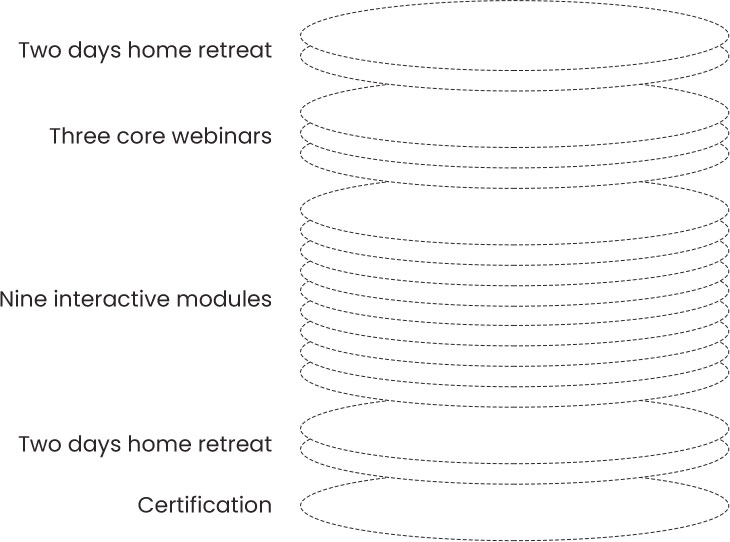The SCIP Program Dynamics.
The Self-Compassion in Psychotherapy (SCIP) Certificate Program is designed and hosted by the Center for Mindful Self-Compassion.
SCIP supports psychotherapists in harnessing the transformative power of self-compassion in psychotherapy in a progressive, experiential, and systematic manner over the course of 30 weeks.
It is a comprehensive training program that includes didactic presentations, discussion sessions, clinical consultation, community-building, and personal practice support. Our intention is to provide a safe and compelling learning environment where participants can be more fully themselves, mirroring the therapeutic space where therapists and clients can access the deep inner resources of mindfulness and self-compassion and bring them into their daily lives.

Therapy Interventions
How can self-compassion become “portable therapy” for clients?
WEEK THREE
When we meet our clients, we meet people who bring their suffering to the room. Their suffering often contains a critical view of themselves and their suffering, shame about their suffering or their own existence, and many times, a defensive resistance to change.
As psychotherapists, we try to create a safe and accepting environment to contain these multiple pains, to maintain an embodied therapeutic presence, and convey compassion and understanding of their suffering and its consequences. When doing so, we create a therapeutic relationship that embodies and conveys compassion.
The individuals bring their unique sufferings that demand therapists to be flexible in the creation and implementation of simple, practical in-session exercises and practices as well as homework exercises that help clients to taste, practice, and develop their own self-compassion “muscles.”
During sessions, exercises, and practice complemented with contextually useful home practice exercises create the possibility of deeper, quicker, longer-lasting changes. In some ways, the therapeutic relationship becomes “portable” and clients can enjoy compassion for many hours beyond the session each week.
The key here is that psychotherapists can help their clients make their own, brief interventions befitting their personal proclivities and life circumstances. The exchange is a mutual process of removing obstacles or “unfolding” clients’ resources, as well as allowing psychotherapists the opportunity to create a customized self-compassion-based process for each client.
Paul Gilbert
Paul Gilbert, FBPsS, PhD, OBE is a Professor of Clinical Psychology at the University of Derby and an honorary visiting Prof at the University of Queensland. Until his retirement from the NHS in 2016 he was Consultant Clinical Psychologist for over 40 years. He has researched evolutionary approaches to psychopathology with a special focus on mood, shame, and self-criticism in various mental health difficulties for which Compassion Focused Therapy was developed. He was made a Fellow of the British Psychological Society in 1993, president of the BABCP 2002-2004, and was a member of the first British Governments’ NICE guidelines for depression. He has written/edited 21 books and over 250 papers and book chapters. In 2006 he established the Compassionate Mind Foundation as an international charity with the mission statement To promote wellbeing through the scientific understanding and application of compassion. There are now a number of sister foundations in other countries. He was awarded an OBE by the Queen in March 2011 for services to mental health. He established and is the Director of the Centre for Compassion Research and Training at Derby University UK. He has written and edited many books on compassion. His latest Book is Living Like Crazy.
Zev Schuman-Olivier
Zev Schuman-Olivier, MD is the Director of the CHA Center for Mindfulness and Compassion, Medical Director for Addiction Services as well as Director of Addiction Residency Education and Mindful Mental Health Service at CHA. Dr. Schuman-Oliver is faculty in the Department of Psychiatry at Harvard Medical School and a faculty member in the Department of Biomedical Data Sciences at Geisel School of Medicine at Dartmouth. As a board-certified addiction psychiatrist, he has been involved with research and clinical care of patients with addiction, mental illness, and chronic pain both in mental health and primary care settings. He is a founding member of the Mindfulness Research Collaborative and is part of the NIH Science of Behavior Change Initiative. He is the principal investigator of the MINDFUL-PC project, which is leading the way in integrating mindfulness into the patient-centered medical home. He is Director of the Clinical Core for the NCCIH program project grant on synergistic approaches to chronic pain treatment. Finally, he led the development of the MySafeRx integrated technology platform and has been studying the impact of compassionate, motivational mobile recovery coaching and remote daily supervised medication dosing on medication adherence during opioid use disorder treatment.
Marta Alonso
Marta Alonso Maynar, PhD, is a professional collegiate psychologist and specialist in clinical psychology with the Ministry of Education and Science in Spain. As a Clinical Psychologist, she is specialized in mindfulness and compassion treatments. Marta earned an Advanced Masters´ Degree in Clinical Psychology and another one in Child and Adolescent Psychotherapy. Her career has developed primarily in the areas of teaching compassion and mindfulness to therapists, especially about integrating them in anxiety disorders. She also has taught several Self-Compassion in Clinical Practice workshops with Dr. Chris Germer internationally and is the Vice President of the Executive Board of the Center For MSC. As the first certified MSC teacher in the Spanish language, Marta is an MSC Teacher Trainer and Mentor, and has taught more than 50 editions of the program. She is a co-author of “Mindfulness en la Práctica Clínica” and produced with Dr. Simón the bestsellers CD-books: “Mindfulness y Autocompasión” as well as several papers and book chapters. She holds the European Certificate of Competence in Professional Psychology “Europsy” and the recognition as European Expert in Psychotherapy by the EFPPA.
In her words: “I have seen how the MSC has helped thousands of people from different cultures and contexts because it teaches us to remember that all human beings have a compassionate heart full of seeds of love to be watered. Self-compassion is our universal legacy and it is a privilege to teach this program”.
Lorraine Hobbs
Lorraine M. Hobbs, M.A., is the Founding Director of the Youth, Family & Education Programs at the UCSD San Diego Center for Mindfulness. She is a family therapist and former clinical director of adolescent treatment programs. Lorraine is certified to teach Mindfulness Based Stress Reduction (MBSR), Mindful Self-Compassion (MSC), and Compassion Cultivation, Altruism, Research & Education (CCT), a Stanford University accredited program created by contemplative scholars and endorsed by H.H. The Dalai Lama.
During her tenure at the Center for Mindfulness, she designed and implemented curricula in mindfulness-based interventions for multiple age groups, including a program in Mindful Compassionate Parenting. She is a pioneer in self-compassion training for parents, teens and kids and is co-author of Mindful Self-Compassion for Teens, formerly known as Making Friends with Yourself. This teen program in self-compassion is adapted from the Mindful Self-Compassion program for adults created by Kristin Neff, Ph.D. & Chris Germer, Ph.D. Lorraine is co-founder of the teacher training program and provides teacher training in the teen curriculum throughout the U.S. and internationally. Her new curriculum for kids and parents, A Friend in Me: An emotional strength training program in empathy, kindness and compassion for kids and parents, offers parents and kids an opportunity to build skills together that can foster deeper listening, self-regulation, and resilience. Lorraine is also a mentor for the Mindfulness Based Stress Reduction certification pathway at the UCSD MBPTI and Director of Project Huruma (Compassion in Swahili), a non-profit, humanitarian organization focused on teaching mindfulness and self-compassion.
Ben Weinstein
As a Clinical Psychologist, lecturer and trainer serving expatriate and local communities across Southeast Asia since 2003, Ben is committed to facilitating growth and development in many contexts. He is profoundly inspired by the remarkable alchemy of mindfulness, purpose-guided engaged living, and self-compassion. Ben uses an experiential-behavioral approach to psychotherapy, specializing in trauma, emotional regulation, intercultural adjustment, dislocations, and resilience. Ben shares the MSC training program in English and Thai. He also volunteers his time to organize mindfulness retreats and trainings for Thai healthcare professionals. Ben holds a M.S. and Ph.D. in Clinical Psychology from the University of Wisconsin-Milwaukee and is currently adjunct lecturer in the Department of Psychology at Chiang Mai University.
Feel free to share Meet the SCIP Experts with your network!

Week 1
Open now

Week 2
Open now

Week 3
Open now

Week 4
Replay the launch webinar